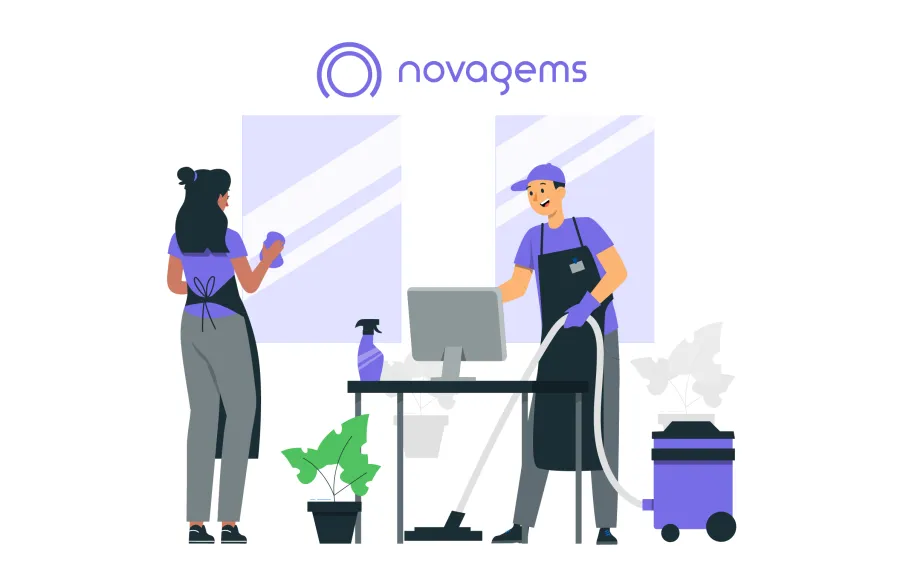Why a Cleaning Business needs to be Insured & Bonded
Thu, Aug 1, 2024
Read in 7 minutes

Starting a cleaning business involves more than just buying equipment and hiring staff. One of the most crucial steps is ensuring your business is both insured and bonded. The cleaning business is more than keeping the space neat and clean. You and your team are open to risk at all times. That is why after starting a cleaning business, the next step is always getting insurance. This might sound complicated, but understanding these concepts is essential for the protection and success of your cleaning company.
Insurance and bonding provide a safety net for your commercial cleaning service. They protect against financial losses, help build trust with clients, and ensure you comply with legal requirements. This blog will break down why these protections are important, what types of insurance you need, and how to get your business insured and bonded.
The Importance of Getting Insured and Bonded for a Cleaning Business
Insurance and bonding are two different but complementary protections for your cleaning business. Insurance protects your business from financial losses due to accidents, injuries, property damage, and other risks. Bonding, on the other hand, protects your clients by making sure they will be compensated if your business fails to fulfill its contractual obligations or if an employee commits theft.
Having both insurance and bonding shows clients that you take your business seriously and are committed to providing reliable and trustworthy services. It also gives you peace of mind knowing that you are protected against potential financial setbacks. So now I hope you get a general idea of why a cleaning business needs to be insured and bonded
Types of Insurance Necessary for Cleaning Businesses
To provide top-notch cleaning services and protect your business, you need to have several types of insurance. Each type of insurance covers different aspects of your business, ensuring comprehensive protection.
-
General Liability Insurance
General liability insurance is a must for any cleaning business. It protects you from a variety of risks, including:
- Third-Party Property Damage: If your employee accidentally damages a client’s property, this insurance covers the repair or replacement costs.
- Bodily Injuries: If a client or third party gets injured due to your business operations, such as slipping on a wet floor, this insurance covers medical expenses and legal fees.
- Advertising Injuries: This includes protection against claims of libel, slander, or copyright infringement related to your business advertisements.
General liability insurance is often required in client contracts and lease agreements, making it a fundamental part of your business operations. It ensures that your business can handle claims related to accidents or damages that occur during your cleaning services.
-
Workers’ Compensation Insurance
Workers’ compensation insurance is essential if you have employees. This insurance covers medical expenses and lost wages if an employee gets injured or sick while on the job. For example, if an employee falls off a ladder while cleaning windows, workers’ compensation would cover their medical bills and a portion of their lost wages during recovery.
In many states, having workers’ compensation insurance is a legal requirement as soon as you hire your first employee. This coverage not only protects your employees. But it also shields your business from potential lawsuits related to workplace injuries. By providing this insurance, you show your employees that you care about their well-being and are prepared to support them in case of work-related injuries.
-
Commercial Auto Insurance
If your professional cleaning business uses vehicles for transporting equipment and staff to job sites, commercial auto insurance is necessary. This insurance covers:
- Vehicle Damage: Repairs or replacement of your vehicle if it’s involved in an accident.
- Property Damage: Costs associated with damage to another person’s property in an accident.
- Bodily Injury: Medical expenses for injuries sustained by others in an accident involving your business vehicle.
If employees use their personal vehicles for work purposes, you might also need hired and non-owned auto insurance to cover those situations. This ensures that your business is protected from financial losses related to vehicle accidents. Regardless of who is driving.
-
Surety Bonds
Surety bonds, also known as janitorial bonds in the cleaning industry, are a type of insurance that protects your clients. These bonds assure clients that they will be compensated if your business fails to meet its contractual obligations or if an employee commits theft.
There are two main types of bonds your cleaning business might need:
- License and Permit Bonds: Required by local governments to ensure compliance with laws and regulations. These bonds demonstrate that your business adheres to industry standards and local regulations, providing additional credibility.
- Fidelity Bonds: Protect clients against losses due to employee theft. This type of bond reassures clients that they are financially protected if an employee steals from them during the course of their work.
Having surety bonds enhances your business’s reputation and trustworthiness, making it easier to attract and retain clients.
How to get Bonded and Insured for a Cleaning Service
Getting your cleaning business insured and bonded involves several steps. By following these steps, you can ensure that your business is adequately protected and complies with legal requirements.
-
Research Your Needs
The first step in getting your cleaning business insured is understanding the specific risks associated with your operations. Consider the following:
- The size of your business and the number of employees
- The types of services you offer
- The value of your equipment and property
- The legal requirements in your state or locality
By assessing your business’s unique needs, you can determine the types and amounts of insurance coverage required to protect your operations.
-
Choose the Right Insurance and Bond Providers
Once you know what types of insurance and bonds you need, start researching providers. Look for companies that specialize in business insurance for cleaning services. Compare quotes and coverage options to find the best fit for your business needs and budget.
Choosing a reputable insurance provider is crucial. Consider factors such as the provider’s reputation, customer service, and financial stability. Reading reviews and seeking recommendations from other business owners can help you make an informed decision.
-
Apply for Insurance and Bonds
Contact your chosen insurance and bond providers to start the application process. Be prepared to provide detailed information about your business, including:
- Business structure and ownership
- Number of employees
- Types of services offered
- Annual revenue
The application process may involve providing documentation, such as business licenses and financial statements. Ensure that you provide accurate and complete information to avoid delays in obtaining coverage.
-
Maintain Your Coverage
Once you have your insurance and bonds in place, it’s important to maintain your coverage. This includes:
- Paying premiums on time: Timely payments ensure that your coverage remains active and your business is protected.
- Renewing policies as needed: Review your insurance policies regularly and renew them before they expire to avoid any gaps in coverage.
- Updating your coverage if your business grows or changes: If you expand your services, hire more employees, or acquire new equipment, update your insurance policies to reflect these changes.
Regularly review your policies to ensure you have adequate protection for your business. As your business evolves, your insurance needs may change, so staying proactive is essential.
Common Risks Faced by Cleaning Businesses
Cleaning businesses face a variety of risks that can lead to financial losses. These include:
- Property Damage: Accidental damage to a client’s property, such as knocking over a valuable vase or scratching a surface, can result in costly repairs or replacements.
- Bodily Injuries: Clients or third parties can get injured due to your business operations, such as slipping on a wet floor or tripping over cleaning equipment.
- Employee Injuries: Professional cleaning services involve physical labor, and employees can get injured while performing their duties, such as falling off a ladder or getting hurt by cleaning chemicals.
- Theft: Unfortunately, employee theft can occur in the cleaning industry. Leading to financial losses and damage to your business reputation.
Understanding these risks highlights the importance of having the right insurance and bonding to protect your business.
Conclusion
Insurance and bonding are critical components of a successful cleaning business. They protect your business from financial losses, enhance your credibility with clients, and ensure you comply with legal requirements. By understanding the types of insurance you need and following the steps to get insured and bonded, you can secure the future of your cleaning business and build a trustworthy reputation in the industry.
By investing in the right insurance and bonds, you demonstrate your commitment to providing reliable and professional cleaning services. This not only attracts more clients but also safeguards your business from potential financial setbacks. Remember, a well-insured and bonded cleaning business is a secure and successful one.
Get a Free Trial
Sign up For Newsletter
Latest Blog Posts
Get Started
Start being productive & grow your business
with Novagems




